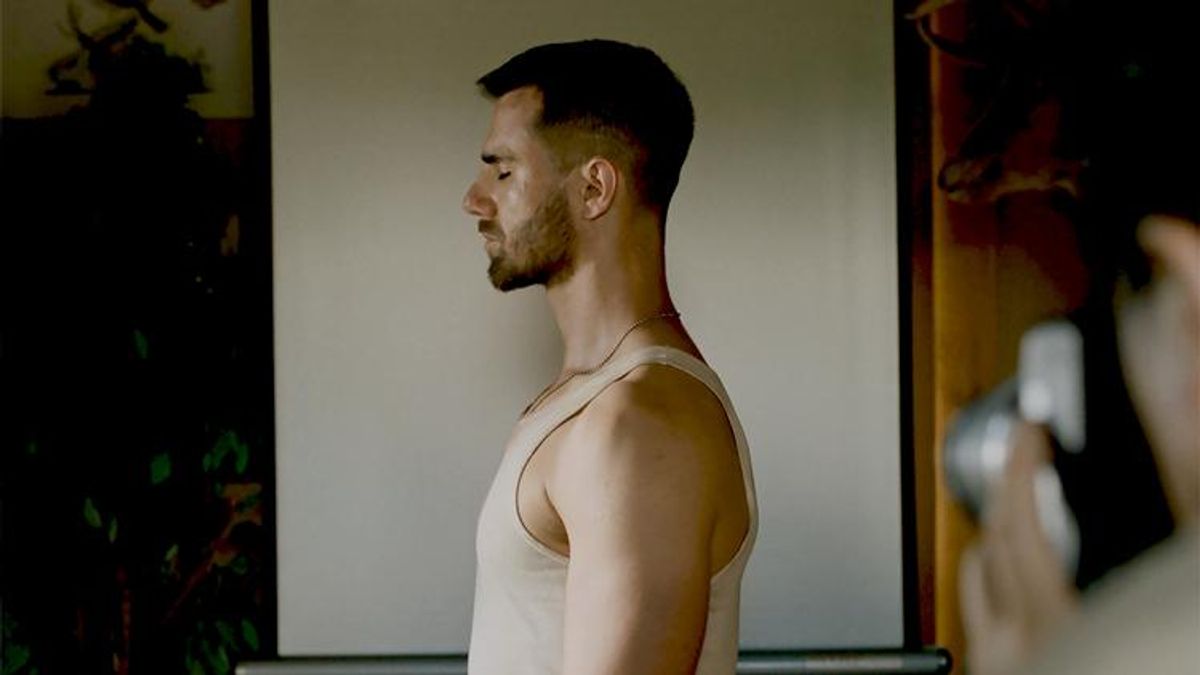Print Issue
VIDEO: New Horror Film Centers an HIV-Positive Character & Actor

Peter McPherson discusses being one of the first HIV-positive actors intentionally cast to play a character living with HIV.
January 09 2023 9:06 PM EST
By continuing to use our site, you agree to our Privacy Policy and Terms of Use.

Peter McPherson discusses being one of the first HIV-positive actors intentionally cast to play a character living with HIV.
Every so often, an email shows up in your inbox that has the power to change your life. For British actor Peter McPherson, that message came by way of his agent, who sent him a lead on a new horror film called Others that addresses the stigma HIV-positive people face.
The short film, produced by Toronto-based HIV hospital Casey House, caught McPherson’s attention right away. Not only did the film itself highlight the difficulties of living with HIV, but the producers were adamant about casting an HIV-positive actor to play the role.
With his role in Others, McPherson is the first professional actor living with HIV intentionally cast to play an HIV-positive film lead.
Actor Peter McPherson in a scene from Others
“It is an absolute badge of honor that I wear with pride,” says McPherson. “I didn’t know this until the premiere, but they looked all over Canada, couldn’t get anyone. They looked all over America, no one would come forward.”
The casting directors faced the same issue every time: Actors didn’t want to come forward because they didn’t want to declare their status in case it affected their future and career.
“Then there’s me with my hand up, ‘I’ll do it,’” McPherson says.
McPherson hadn’t heard of Casey House before, but after researching its mission, he went all in for the film. He thanked Casey House officials at the end of the audition for everything they did and shared some of his personal experiences that helped him relate to the main character.
“The number one question I always get is how being outwardly spoken about my status has affected me, but it’s only been positive. If I hadn’t been so open about this, my agent wouldn’t have gone, ‘Peter, this has come in and see what you think.’ This project showed me good things can come from being open about your status.”
The stigma associated with HIV kept most actors at bay from the role, but that’s the exact topic Casey House examines in the film.
“Casey House, what they’re so great about is they know the conversation changes,” says McPherson. “They know that in the 1980s it was a different conversation than it is today. It’s not a death sentence anymore.”
A few years ago, when a story broke about people refusing to eat food prepared by HIV-positive workers, Casey House created a campaign to open June’s HIV+ Eatery, a restaurant with only HIV-positive chefs. After that, Casey House officials campaigned for Healing Hands, a spa where all massage therapists are HIV-positive.
“This year, they’re having a look at ‘what is stigma?’ They really get to the point where it’s like… stigma is fueled by fear,” McPherson says. “You see how the conversation has changed and how their campaigns have changed, as well.”
Actor John Ng plays a hostile park ranger in the film
Casey House is much more than a place for medicine. McPherson learned that for himself during the premiere when Casey House CEO Joanne Simons gave him a personal tour of the facility. When he saw all of their work in person, he burst into tears.
“They’re looking at different therapies, the physical side to it, the emotional side to it, the spiritual side to it, the everything. It’s literally like they encompass everything, and I’ve never experienced anything like that, not even in the U.K.,” he says. “To be there where Princess Diana was, [where] those famous photos of her touching someone with AIDS [took place], that changed the world and the way people viewed people with HIV. It was just really powerful.”
Real and lived experiences went into the Others script — the spooky film was written and directed by Paul Shkordoff — and McPherson’s stories helped mold the final product.
“I think what this film does is, especially in horror, it tackles quite complex social issues. Get Out tackled racism and Rosemary’s Baby tackled reproductive rights. Horror, what it does so brilliantly, because it’s all about fear, it takes the audience through a journey,” McPherson says. “You get to feel what the protagonist is going through. You get to feel that fear, which is what makes horror unique in the sense of doing that.”
Scary movies can do more than create goosebumps or elicit a thrill, according to Dr. Joseph LeDoux, Professor of Neuroscience at New York University.
“There are various reasons why horror films are capable of triggering strong emotional reactions related to fear,” LeDoux says in a statement. “Research shows that both traditional fight-or-flight responses, and an individual’s personal and prior experiences, contribute to how one will respond to horror films. I believe that the unique power of horror films is that they bring on an immediate response in a relatable and engaging way in a safe setting.”
Although Others is a heightened story, McPherson hopes people understand the stigma of what it’s actually like to experience living with HIV.
“Hopefully that will spark some conversations,” he said. “That’s only a good thing, especially if it’s addressing outdated misconceptions or bringing the conversation into the mainstream media. Stigma hides in secrecy. There’s not just stigma in society, but internalized stigma too. If it’s talked about more, then hopefully it breaks down these barriers.”
Go to SmashStigma.ca to watch Others and follow the conversation on social media using the hashtag #smashstigma.
Also, watch an exclusive clip below from an interview with the film's star, Peter McPherson, on the latest episode of +Talk, which airs Tuesday, January 10: